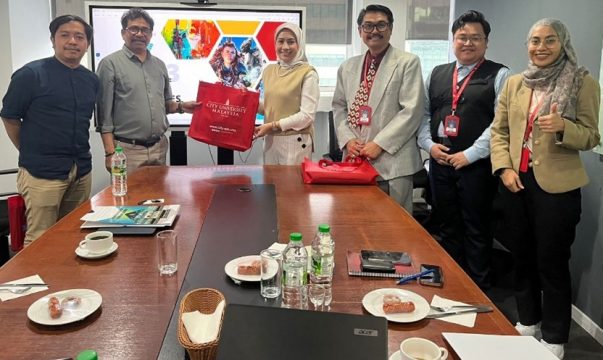Welcoming Dr. Hipolitus Kristoforus Kewuel, M.Hum., and Nindyo Budi Kumoro, M.A at City University
Following up on the commitment of the Rector of Universitas Brawijaya (UB) and the Dean of the Faculty of Cultural Studies (FCS) to improve the quality of the Three Pillars of Higher Education, on November 2-7, 2023, a delegation from the Department of Arts and Cultural Anthropology (DSAB), Dr. Hipolitus Kristoforus Kewuel, M.Hum. and Nindyo Budi Kumoro, M.A., left for Universities in Malaysia.
Before leaving, online preparation coordination was held with the four universities in Malaysia: the University of Malaya, the University of Putra Malaysia, the University of Malaysia Sarawak, and City University. Everyone welcomed this collaboration initiative from FCS UB and was ready to discuss activities that could be collaborated together.
According to the Head of DSAB, Dr. Hipolitus Kristoforus Kewuel, M.Hum., this step was taken not only because of the Rector and the Dean’s direction, but more importantly as a form of moral responsibility in the management of two study programmes, the Study Programme of Anthropology (SPA) and the Study Programme of Fine Arts (SPFA), which this year have obtained international accreditation status.
“This collaborative visit is more intended to ensure the existence of cooperation documents but also to prepare several cooperation contracts with partner universities, which will become part of the work programmes of the two study programmes in 2024,” he stressed.
In summary, apart from agreements regarding several agreement documents (MoU and MoA), there were also several work contract documents (Implementation Agreement/IA) with each university.
At the University of Malaya were made an employment contract in terms of Visiting Professor for SPA. Other employment contract in terms of Research was made between SPA with Putra University Malaysia. At City University there was a work contract in terms of workshops and batik exhibitions with the SPFA. The other work contract with University of Malaysia Sarawak in terms of Research was also made with the SPA and a Visiting Professor with the SPFA.
According to Dr. Hipo, these agreements will most likely be done together in 2024, considering the availability of funds at both universities. Regarding the research, it was agreed that a collaborative programme could be started by utilizing existing routine funds while jointly preparing proposals to access international grant funds.
There were also agreements on research themes. Migration Theme with the University of Malaya. The theme of culture, cultural heritage and food with Putra Malaysia University. Art and ritual themes with the University of Malaysia Sarawak and City University.
Nindyo added that the 2024 work contract was derived from the MoA, which contains general points of agreement.
“It shows that each study programme still has the opportunity to build a new work agreement or contract, which is adjusted to the availability of funds,” he said.
During the cooperation discussion process, both parties realized that this cooperation was essential and urgently needed in educational work at universities, but also realized that differences in regulations between countries required a longer time for the adjustment process.
“That is why, until we returned to Indonesia, the majority of documents were still being processed, and we continued to communicate until we finally got the documents,” said Nindyo.
In addition to these efforts, in this semester, SPA has begun to open several classes taught in English. SPFA has started to conduct batik exhibitions and workshops in Australia.
“With the existence of several collaboration contracts with four universities in Malaysia, starting in 2024, DSAB will have more international activities to add to other international activities that have been running regularly, such as the 3 in 1 Programme, guest lectures, joint research and publications, English language classes, and so on,” explained Dr. Hipo. [trans.dts/ed.vidya/PR FCS]

